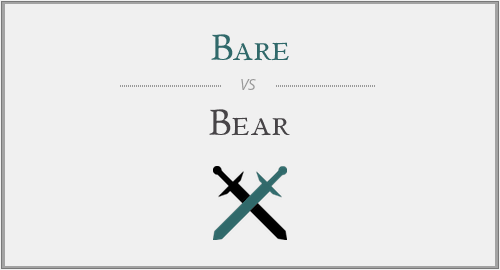The English language is full of homophones, words that sound the same but have different meanings. "Bare" and "bear" are two such words that are often confused due to their similar pronunciation, but they have distinct meanings and usage.
Bare
"Bare" is an adjective that describes something that is uncovered, naked, or lacking in adornment. It refers to the state of being without the usual covering or embellishment. Here are some examples of how "bare" is used:
- The tree branches were bare in the winter.
- He walked with bare feet on the sandy beach.
- The room had bare walls and minimal furniture.
Bear
"Bear" can be both a noun and a verb, and it has multiple meanings. As a noun, "bear" refers to a large mammal with a shaggy coat that is typically found in forests. As a verb, "bear" means to carry, support, or endure something. Examples include:

- The bear walked through the forest searching for food.
- She couldn't bear the pain any longer.
- The bridge is designed to bear heavy loads.
It's important to note that the context in which "bare" and "bear" are used is crucial in understanding their meanings. While "bare" refers to a lack of covering or adornment, "bear" refers to a large mammal or the act of carrying or enduring something.
In summary, although "bare" and "bear" may sound alike, their meanings and usage are distinct. By paying attention to the context, you can confidently choose the correct word and avoid confusion in your writing and conversations.




Have a discussion about this article with the community:
Report Comment
We're doing our best to make sure our content is useful, accurate and safe.
If by any chance you spot an inappropriate comment while navigating through our website please use this form to let us know, and we'll take care of it shortly.
Attachment
You need to be logged in to favorite.
Log In